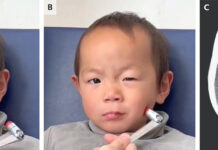Should sushi eaters be worried about tapeworms?
Eating raw, fresh food increases your risk of getting food poisoning. Therefore, if your sushi has raw fish then you should eat it no later than 24 hours. Symptoms of food poisoning are often mild and include diarrhoea, stomach cramps, nausea and vomiting. However, sometimes, even life-threatening. Such as the case of this 34-year-old woman who ended up in the ER after eating 5-day-old sushi. The symptoms were later attributed to tapeworms in her GI tract.
The 34-year-old mother present to the emergency with complaints of hallucinations and insomnia. She was struggling with these symptoms for over a few months now. What’s more, she even suffered from seizures twice within this tenure of her illness. Despite multiple hospital visits, the doctors were unsure of what was causing her symptoms.
She underwent several unsuccessful treatments till the doctors discovered that all this time the problem was living in her stomach.
When the doctors further questioned her she told them that a few months she’d eaten sushi that was in her fridge for 5 days. She bought the sushi from a service and didn’t find the need to eat it till she returned home late in the night starving one day.
The sushi did taste a bit sour but she masked the flavour by putting soy sauce on it. Although, a few months after eating the sushi, she started to feel extremely unwell. The symptoms started with insomnia and her anxiety was over the roof. She also felt like her heart was “beating out of her neck”. In addition, she also experienced stomach cramps and a jiggling sensation in her stomach before she defecated. She said it felt like something was “flapping around in her belly”.
Things got much worse for her when she started hallucinating.
She would often hallucinate seeing creepy crawlies on the wall and under her skin. One night she lost sensation in her hands and feet and felt urine dripping down her legs. Her husband immediately took her to the hospital. On examination, doctors could not find any significant cause of her problems. They then recommended that she underwent cognitive behavioural therapy to deal with stress and help her sleep.
After going back home, she was again “mumbling to herself in the corner, shaking and her pants were wet,” said her husband. She started having a seizure and passed out. Her husband called an ambulance and took her to the hospital. Blood tests revealed that she had abnormally large red blood cells. Whereas her white blood cells were malformed. The findings led to a diagnosis of anaemia. Doctors further performed a neurological examination which showed a loss of sensory awareness and neurodegeneration.
According to her husband, she was barely eating one meal a day.
Further tests showed vitamin B12 deficiency which was causing severe nerve damage, an inability to sleep, delusions, psychosis and hallucinations. Doctors injected her with Vitamin B12, after which she was able to sleep well at night after months. However, two months later, she had another seizure. And her vitamin B12 was extremely low despite the supplements.
For further evaluation, doctors examined her stool which revealed thousands of eggs measuring 40×60 micrometers long. They also found broken tapeworm segments in her stool. All her symptoms were then attributed to a giant tapeworm living in her GI tract. The tapeworm was identified as species diphyllobothrium latum. The tapeworms can grow up to 9 m long and feeds on vitamin B12, exactly what was happening with the patient.
The risk of becoming infected with tapeworm is most common with eating raw and uncooked fish, for example, with sushi and sashimi. The tapeworms explained her vitamin B12 deficiency and symptoms.
References
Woman’s brain altered by old servo sushi https://m.qt.com.au/news/womans-brain-altered-by-old-servo-sushi/4150666/?fbclid=IwAR2JRpf3hlTdxlgakYsNZXjzqgfRYJV3PA5F86S14rE_qTaU_LH2LS1F9ZA




